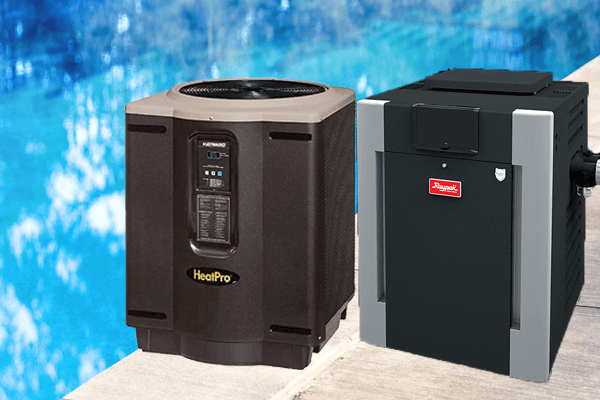It’s that time of the year when we all enjoy pool parties with our homies! But jumping into a cold-freezing pool isn’t anything enjoyable, right? The chilled water of your pool can spoil the whole party mood. In such a situation, a pool heater can become your savior.
When it comes to warming up your pool water, there are two ways of doing it. You can either choose an electric pool heat pump or a gas heater.
Pool heat pump vs. gas heater, which one is worth paying for? As a newbie, you may get confused between these options. So, I’ve decided to comprehend a detailed comparison between the electric heat pump and a gas heater. I will discuss every feature of the Pool heat pump and a gas heater to choose the convenient one.

Comparison of Pool Heat Pump and Gas Heater
| Heat Pump | Gas Heater |
| An electric heat pump requires less maintenance and costs less to operate, it will save you bucks. | Gas heaters require comparatively more Maintenance than electric heaters, However, the Maintenance cost is pretty reasonable. |
| An electric heat pump’s lifespan is around 20 years. | A gas heater can last around five years. |
| Electric heat pumps can perform like a snap, even after operating them the whole day. This top-coat machine can be used 24/7 without breaking the bank. | Gas pool heaters work quickly. You don’t have to run it the entire day. |
| Electric heater Works well both on big and small size bool | Gas heater works better on small and medium-size pool |
| Electric heater Electricity costs can increase the expanses of your household | Gas heater Fuel cost can increase the costing level. |
| Electric heaters can freeze in extremely cold weather. | The gas heater works well on all weather. |
| Electric heaters require more energy | Gas heaters require less energy. |
Electric heat pump
An electric heat pump sucks in the environmental air from outside and warms it up. The warmer the environment is, the warmer the water will become. The inhabitants of warmer countries tend to prefer an electric heat pump more than the others.
If the temperature in your area is no less than 40-50 Degree Celsius, it is a good choice for you. On the other hand, areas with temperatures below 40-50 degrees Celsius are not competent for this pump. The pump is inefficient for those areas.
Gas heaters
On the contrary, Gas heaters work using natural gas or propane for keeping the water ambiance warm. If you’re searching for something that can turn the pool water warm in no time, a gas heater would be a perfect choice.
The most vital point about gas heaters is their controlling power. You can control the temperature of your pool according to your desire with a gas pump. The desired temperature will provide spa-like comfort l level all over the year.
What You’ve Been Missing
Best Above Ground Pool Vacuum
Can You Shock a Pool without the Pump Running
How Long Does It Take for a Pool to Heat Up by the Sun
Pool Heat Pump vs. Gas Heater: Basic Differences
Cost
The expense of an electric heat pump varies depending on whether it’s in-ground or above-ground. The in-ground electric heat pumps cost nearly $2,500-$5,000, which is much more expensive than gas heaters. Contrarily, the above-ground electric heat pumps cost $1,700-$2,500.
The operating expense of Electric heat pumps is significantly less than gas heaters. The annual cost on average is $8,00-$1,000. And you can cut down a generous amount of expense if you cover the pool while not in use.
On the other hand, the cost of pool gas heaters is quite affordable. Most of the households in the USA choose gas pool heaters because of their low cost. Besides, the maintenance and availability are comparatively reasonable.
The gas heater operating cost will be around $14.02 to 1 million Btu in the USA. The exact costing will vary according to your maintenance and use. If you take good care of the gas pump, the efficiency and reliability will increase.
The maintenance cost is lower than the electric heat pump. The annual savings by a heater is around $420.
Size
Electric heat pumps work well, only if you’re able to choose the right size. The experts categorize electric heat pumps based on horsepower (HP) and British Thermal Unit (Btu) output.
If you ask me about their standard size, the answer is 3.5 HP/75,000 Btu, five HP/100,000 Btu, and six HP/125,000 Btu. I suggest you hire a professional if you’re confused about which size is the right one.
When it comes to gas heaters, pool sizing is quite important to control the temperature. The gas swimming pool heaters are comparatively bulkier. Heater pumps carry the extra gas pumps and extra equipment.
If you ask about the recommended size, it will depend on the pool size. If your pool size is around 16” x 32”, the heater size will be 250,000 Btu, 18” x 36” of pool size will require 325,000 Btu, and 20” x 40” size swimming pool will require around 400,000 BTU gas heat pump.
Performance
No matter how well-built the heat pump is, all will go in vain if the machine isn’t efficient enough. Even though measuring efficiency is complex, the experts can do it well.
The coefficient of performance (COP), ranging from 3-7, is the key to measuring efficiency. The higher the COP, the better the efficiency will stand.
Never forget to research the efficiency of the heat pump you’re about to purchase. You can also check out the reviews of the product for assurance. Even if the efficiency has good ratings, this feature alone isn’t enough.
On the contrary, Gas heaters’ performance level extends from 75,000 Btu to 450,000 Btu. Before, people considered gas pumps to be lower in serving efficient performance.
However, now gas pool heaters are showing great success and efficiency with their performance. On today’s date, you’ll get gas pumps serving around 95% performance efficiency.
If you compare the run time, gas heaters seem to serve better and reasonable run time with the fuel tank.
Frequently Asked Questions
What is a good temperature for a heated pool?
Well, you can set your swimming pool cheating temperature around 78°F and 82°F. This is the suggested temperature to keep up a warm and cozy water ambiance for swimming.
Do pool heat pumps make noise?
Yes, pool heat pumps can make slight noises. A high-quality heat pump can make noise around 55 to 7- decibels noise. If you experience any extreme grinding/ whooshing it might require some troubleshooting.
Conclusion
Electric swimming pool heater and Gas heater both are quite popular to maintain your swimming pool ambiance.
However, both of these options carry some significant differences. This article has explained Pool heat pump vs. gas heater differences from a buyer’s point of view. Regarding the facts and features, you can decide which method you should choose for the pool.
